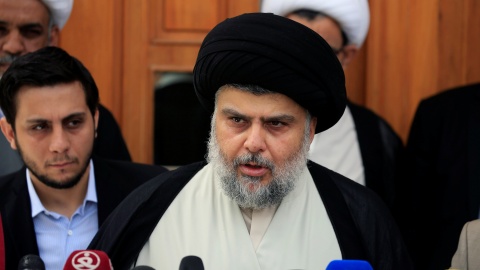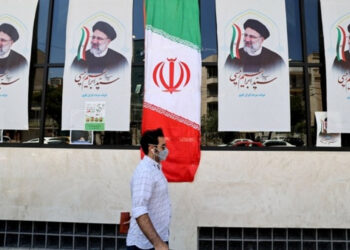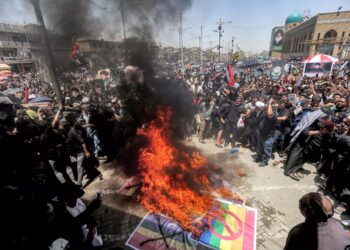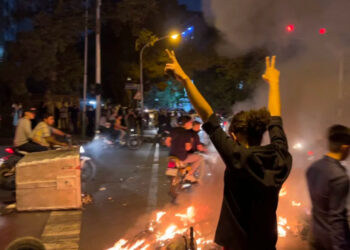A new Iran-backed parliamentary coalition in Iraq represents a significant shift, a major triumph for Iran in its bid to project its power in the war-torn country and a blowback to Washington’s efforts to curb Tehran’s influence in the region.
About three weeks ago, the two most successful Shia electoral coalitions in the May Iraqi elections, Saeroun (composed mainly of Moqtada al-Sadr‘s followers) and Fateh (mainly Iranian-supported militias led by Hadi al-Amiri), announced their parliamentary coalition. It would be the biggest bloc in the coming parliament, with 101 out of 329 seats, based on the results published thus far.
This alliance flagged a very important question among Iraqis and foreign observers: why would al-Sadr, who ran as an anti-foreign influence candidate, form a coalition that is decidedly pro-Iranian? Such an alliance will not only bring Iraq back to sectarian politics and policies but will also increase Iranian influence in Iraq, which had declined during the last four years of Haider al-Abadi’s government, though al-Abadi also announced a coalition with al-Sadr two weeks later.
During the last couple of years, al-Sadr has publicly challenged Iranian influence and showed more alignment with the anti-Iranian Arab axis. His Shia followers asked Iran to get out of Iraq in their weekly protests during 2017. According to a nationwide poll I conducted in April 2018, around 60 percent of al-Sadr’s ardent supporters said that Iran is not a reliable partner.
Due to al-Sadr’s critiques of sectarian governmental policies during the Nouri al-Maliki era (2006 to 2014) and his anti-Iranian statements, Sunnis, who were always against Iranian influence, showed strong support for al-Sadr’s platform. Al-Sadr became one of the Sunnis’ most popular potential leaders, with 63 percent of them saying that they had a favorable opinion of al-Sadr in the same poll as mentioned above.
In the hope of change, communists and some other secular, anti-sectarian activists decided to run on his electoral ticket. Accordingly, Saeroun (the alliance of Al-Sadr and other liberal allies) was the big winner in the election with 54 seats, followed by the pro-Iranian list (Fateh) with 47 seats.
A post-election nationwide survey that I conducted two days after the first release of the May election results, showed that 50 percent of Saeroun voters decided to vote for the list during the last week of the campaign, which means that they are not hardcore Al-Sadr followers but what might be seen as late-breaking “swing voters.”
Around 30 percent of undecided voters voted for the al Al-Sadr list versus almost 15 percent for the Fateh list and 15 percent for the Nasr list, led by current Prime Minister al-Abadi. Winning the swing voters was crucial for the al-Sadr list’s election victory. These swing voters are, for sure, not staunch Sadrists. This victory is supposed to send al-Sadr the message that his non-sectarian, anti-foreign interference electoral platform was successful in making him the biggest vote-getter since he ran in the first election in 2005.
After a number of tweets against sectarianism and foreign interference in Iraq, al-Sadr and Fateh-leader al-Amiri suddenly announced a new Iranian-supported Shia-based parliamentary coalition. So, why did al-Sadr suddenly, and surprisingly, change his stance on Iran and sectarian politics in Iraq?
Though it is still early to judge whether this is a real realignment by al-Sadr or just a tactical step to gain a better negotiation position in forming the new government, it is clear that Iran is investing all its hard and soft power to try to form a very pro-Iranian government in Iraq.
Iran sent two of its top hard and soft power leaders to Baghdad to meet the main Shia politicians. These were Quds Force Commander General Qasem Suleimani and Ayatollah Ali Khamenei’s son Mojtaba Khamenei. Suleimani was, for the last five years, the most influential Iranian military leader not only in Iraq but Syria and Lebanon as well, where the Quds brigade has been very active. Most importantly, he is the person who exercises Iran’s military power abroad. Sending Mojtaba Khamenei, who represents his father’s religious and political authority, sent an unmistakable message to al-Sadr and others that Iran cannot tolerate a new government that does not represent its interests.
To justify this reversal in his position towards Iran, al-Sadr issued a statement saying that this new coalition came about to avoid possible civil war in Iraq. This clearly refers to the fact that Iran may go to great lengths to control the new Iraqi government, even if this means using its allied militias in Iraq to fight those who oppose its influence.
This success in bringing al-Sadr back to the Iranian camp has sent a message to all other anti-Iranian opponents in and outside Iraq. Iran can dictate politics in Iraq to a great degree because it has the means on the ground to do so. The U.S. cannot exercise this kind of power without a huge blowback.
Disclaimer: The views and opinions expressed here are those of the author and do not necessarily reflect the editorial position of The Globe Post.


















